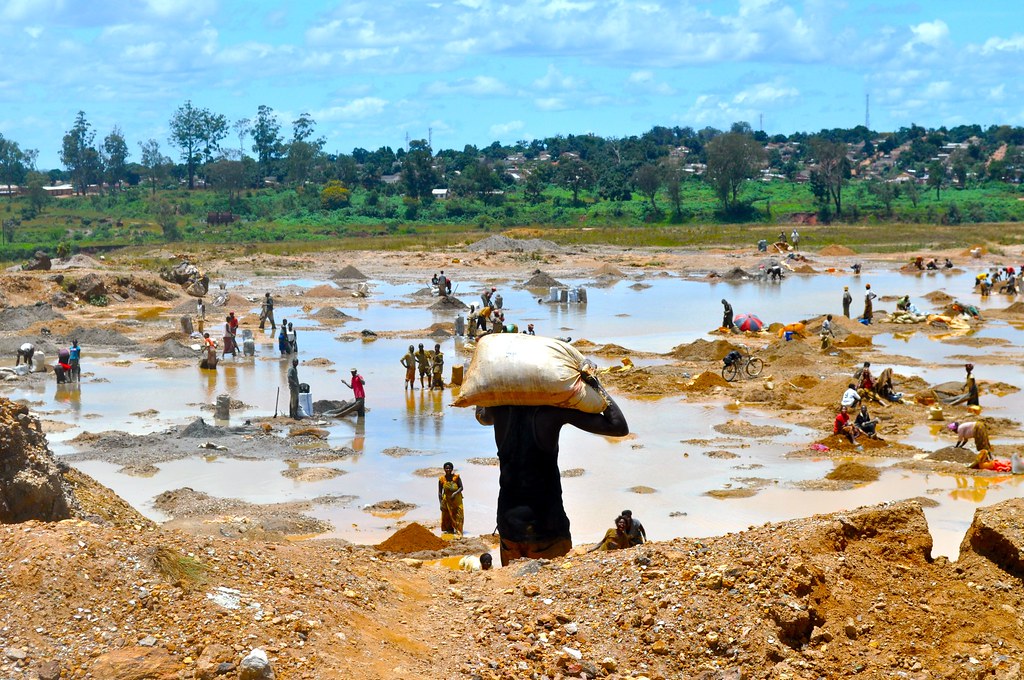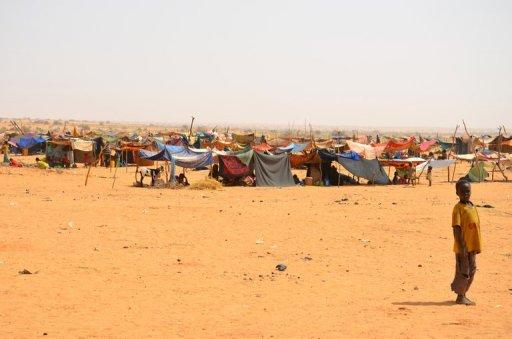Who wants to hear about White Saviourism gone wrong?

A new book on the Congo recycles stereotypes of Africa as a wasteland in need of saving in all its promo. It’s been rapturously received in the West.

As long as people in the West continue to understand local cobalt mining in the Congo as a “grim wasteland of utter ruin”, as in Cobalt Red, as opposed to Wainaina’s landscape in which people laugh, struggle and make do in usually mundane circumstances, history will repeat. Credit: Fairphone.
Last month, award-winning author and academic Siddharth Kara published Cobalt Red: How the Blood of the Congo Powers our Lives. The book draws attention to labour conditions and living standards in areas of the Democratic Republic of the Congo that mine cobalt, a metal that will be critical in the hoped-for global energy transition. Across 250 pages, it argues that by consuming products that contain Congolese cobalt, Western consumers are complicit in a human rights and environmental catastrophe.
In the US and UK, the book has been rapturously received. It became a New York Times bestseller in its first week of release and received a glowing review from the paper. Publishers Weekly heralded it as “a tour de force exposé”, and Foreign Affairs as “a thorough and insightful investigation”. Kara was invited to discuss the book on the Joe Rogan podcast, which has racked up over four million views on YouTube in a little over one month. It has appeared on CNN, Los Angeles Times, The Wall Street Journal, and the Daily Mail, among others.
Cobalt Red has gained an extraordinary amount of attention for a book about the DRC. And yet, the reason the book has resonated so strongly with a Western audience is the same reason it is so deeply problematic. As journalist Howard French once said when reflecting on why the similarly problematic story of rape as a weapon of war in the Congo caught so much Western attention: “It allows us, meaning the general public [in the US], to become interested in Africa in ways that respond to some pre-existing notions we have of Africa. That Africa should be a certain kind of way. That Africa should provide an escalating sense of horror in order to get us interested in it.”
From the blood-soaked title to the interviews and imagery surrounding the book’s promotion, Cobalt Red has provided just such an escalating sense of horror. In an interview with NPR, for instance, Kara invited the listener to “imagine a mountain of gravel and stone just avalanching down on people, crushing legs and arms, spines. I met people whose legs had been amputated, who had metal bars in where their legs used to be.” On Kara’s Twitter feed, which is replete with similar invocations, he posted a video of a cobalt mine, commenting: “Another shot of the grim wasteland at the other end of our rechargeable lives. You will see no dignity or sustainability here…only a poverty-driven scramble for cobalt, leaving behind the utter ruin of people and earth”.
If there were a test based on the late Binyavanga Wainaina’s wonderful satirical piece How to Write About Africa, Cobalt Red would tick every box. “If you are a man, thrust yourself into her warm virgin forests,” writes Wainaina, “your hero is you (if reportage)”. Kara plays this role well, riding “deep into cobalt territory” to provide a “searing, first-ever exposé” of labour conditions in Congo’s cobalt mines (contrary to this last claim, see here and here for just two from a long list of earlier work). Wainaina continues that the writer should “avoid having the African characters laugh…or just make do in mundane circumstances”. There is certainly no laughter or dignity in Kara’s stories of a wasteland of utter ruin. And Wainaina suggests that “Africa is to be pitied, worshipped or dominated”, adding “be sure to leave the strong impression that without your intervention and your important book, Africa is doomed”. Opting for pity, Kara positions Western consumers as the key players in Congo’s fate. On Twitter, he asks “Shouldn’t tech and Electric Vehicle companies do more to support the communities in the DRC that supply their cobalt?”
History repeating
We have been here before. Kara’s narrative arch is straight out of the conflict minerals playbook of the 2000s. This earlier story has not ended well. As recently detailed in Christoph Vogel’s Conflict Minerals Inc. – a superb book that explores multiple drivers of violence in the Congo in contrast to the usual simplistic single narratives – Western advocacy on “conflict minerals” relied on colonial frames to drive change and led to policies that have perpetuated structural violence. The crude misrepresentation of conflict in the eastern Congo as simply being driven by greedy warlords trying to access minerals fed into equally blunt policies that harmed many of the people they sought to support.
Contrary to this narrative, the reality was that mining was the largest employer in the region after agriculture, and that for all the mine sites with links to conflict financing, there were just as many without such links. Regardless, all these mines provided a vital source of income to hundreds of thousands of workers and their households, often at a wage level higher than available alternatives and in a context of widespread local unemployment. These nuances did not fit into stereotypical Western stories or the simplistic campaign against conflict minerals, which drove down demand for eastern Congolese minerals. The impact of this on people in the region was severe, sustained, and widespread. Meanwhile, the conflict itself – which has been making international headlines in recent months with the resurgence of M23 – continued unabated.
As long as people in the West continue to understand local mining in the Congo as Kara’s “grim wasteland of utter ruin” as opposed to Wainaina’s landscape in which people laugh, struggle and make do in usually mundane circumstances, history will repeat. Consciences might be soothed as Western tech and electric vehicle companies put their faith in foreign-owned industrial mines or dubious mineral traceability and certification schemes to secure Congolese cobalt. Consumers might be heartened to learn that due to the perceived supply chain risks surrounding Congolese cobalt, tech and Electric Vehicle companies are working to remove cobalt from their products altogether. But whether any of this will lead to an improvement in the lives of Congolese miners and their families is far less clear.
Might we learn the lessons from this recent history, and in time for the estimated 500% increase in the production of minerals like cobalt – the vast majority of which is extracted from the Congo – that are needed for clean energy transitions? The comparative reception of Kara’s Cobalt Red and Vogel’s Conflict Minerals Inc. cautions against any great enthusiasm. The latter – a meticulous investigation based on long-term fieldwork from a committed Western scholar working on the Congo with Congolese partners for more than a decade – has received little of the mainstream fanfare of the former. No New York Times review or Joe Rogan episode.
Because who in the West wants to hear about White saviourism gone wrong?






Great piece. Do you think such narratives also implicitly encourage people in the global north to think ‘well, if the Africans fuck each other over, then it’s not so much our fault’. This then allows them to displace or forget the history & legacy of colonialism & downplay what imperial countries or mining corporations are still doing in the region?
Distilled, my Africa focus development ethos is couched in metrics long term transactional atavistically calibrated disciplined inspiring the transformative in manner method not necessarily conducive to a quick political photo-op couched harmonizing enhancing positive local home based do-gooding with resultant being enhanced local parochial political support notwithstanding matters defence and international interventions rarely figure positive in Western domestic [re] electoral political publics.
My 30 years dedicated to post conflict development aid assistance in regions states fragile fraught affords me the following thinkings—the developing world has undergone tremendous changes—overall poverty has fallen, people live longer and healthier lives, and economies have been transformed—And yet some States have simply missed the boat.
Why have some States prospered while other have failed?—not because of failure in a specific set of policies,—hope instead is entailed within a key cardinal development bargain,—whereby State elites shift from protecting their own economic social positions and, instead administratively gamble implementing a process procedure controlled managed explicit dedicated to a growth-based state future creating more winners resulting in a State stable secure prospering inclusive for the majority of peoples.
DRCongo’s political social economic publics are approaching the administrative nexus between self centred development resulting in same as same as same as except another political economic group taking from the development cup provided by International Social Economic Interlocutors—chaos civic civil astringent in DRC being the long term resultant.
In the near future I look forward in an Africa centred development aid conversation sharing resulting I hope effecting from Western development assistance transactional inspiring capacity for future transformative changing in DRCongo political social economic publics to the eventual benefit of the 90% DRCongo peoples lacking voice—peoples forgotten and in the East DRC peoples subjected to violence for reasons not necessary solely attributed to minerals.
Allow me this sharing of insight following my return from DRCongo where I was privileged in conversation with Members of CENI Leadership concomitant with Members of Tapis Rouge Red Carpet—DRCongo Gangster Oligarchy exercising power privilege within mien exploitation extraction—not in service to the peoples living functioning in despair.
Elections in DRCongo matter marginal—merely shifting of the metaphorical deck chairs on the Titanic—meet the new boss same as the old boss unless….
DRCongo to flourish being a dynamic economic State grounded in normative public administrative values requires demands a shifting in the pluralist public civic civil social zeitgeist transformative.
Effective prescriptive development aid assistance calibrated in essential National felt empowerment should not be designed for political self centred ego photo op—Effective sound development is long term trenching shifting the social civic civil zeitgeist in constructive citizenship.